A Journey of Purpose: My First Overseas Visit - Switzerland
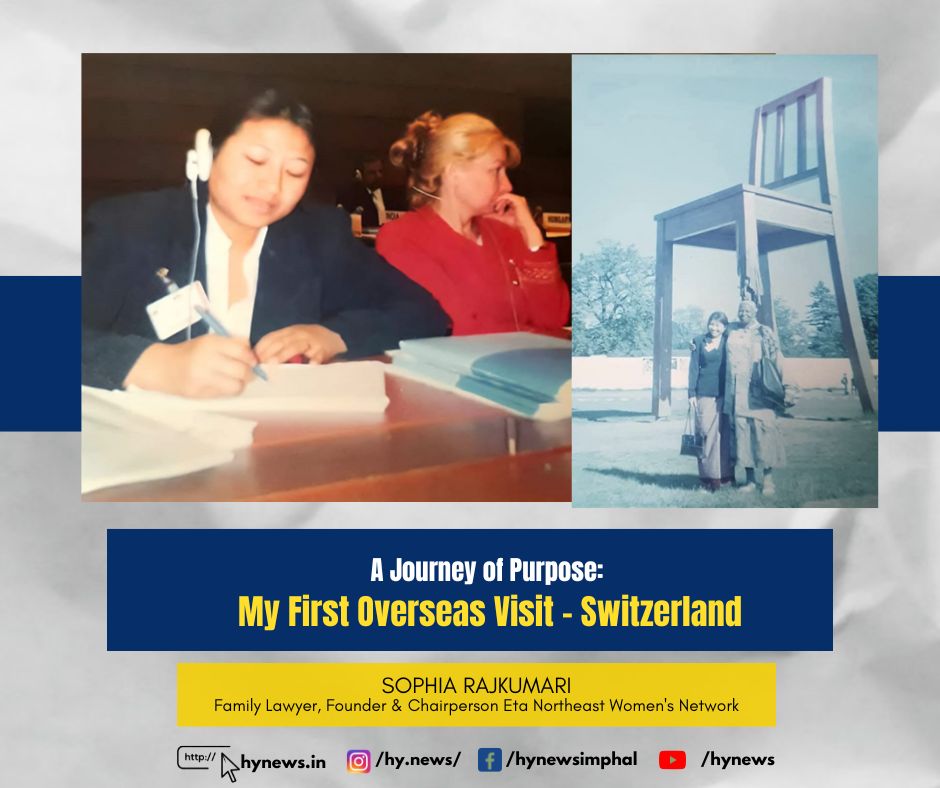
Text Size:
In the dewy-blossomed spring of 2002, with India and Pakistan on the brink of war following the terrorist attack on India’s Parliament the preceding winter, I embarked on my first overseas journey. A trip that carried the weight of purpose far beyond the excitement of travel. Fresh from earning my law degree and fueled by a passion for justice, I was immersed in my work at Majlis, a Mumbai-based legal and cultural organization dedicated to advocating for women’s rights and marginalized communities. The Minority Rights Group (MRG), an international organization advocating for marginalized communities, was organizing a conference on minority rights at the United Nations in Geneva, Switzerland. And I was fortunate to be chosen to be part of the Indian representation at the conference.
The trip followed the Gujarat sectarian riots that year, a devastating wave of communal violence that claimed over a thousand lives. This tragic chapter left deep scars on India’s social fabric. The opportunity to represent India in those fraught times was deeply meaningful. But there was a hitch - I didn’t even have a passport. In a frantic week, I managed to push and prod the bureaucracy at the Passport Office in Mumbai secure one, a whirlwind of paperwork mirroring the urgency of my mission.
As I boarded the flight from Mumbai, I felt a surge of purpose, ready to carry the stories of Gujarat’s survivors to a global stage. The journey began with a whirlwind of emotions. The 10 hour flight to Geneva, with a layover in Frankfurt, was my first time crossing continents, and the novelty of it, watching the world shrink beneath the airplane window, was tempered by the gravity of my mission. The riots had exposed fault lines of communal tension and systemic failures. Representing India at this conference meant advocating for minority rights, while confronting the raw pain of those events.
Landing in Geneva, the friendly and warm MRG team picked me up at the airport and drove me to Cartigny, a stunningly beautiful town near the Swiss-French border, where the conference delegates gathered for an initial meet-and-greet. The drive through Switzerland’s countryside, with its rolling hills and quaint villages, was breathtaking, a stark contrast to Mumbai’s chaotic streets.
Cartigny’s serene landscapes felt like a postcard, and there, I met delegates from Bangladesh, Romania, the Czech Republic, Philippine, Cambodia, Turkey, France, Chechen republic, Laos, Botswana and various African countries each bearing their community’s burden. We bonded over a long walk through the town’s lush woods, where we saw the border fence with France, just a simple pole dividing the countries. Unlike most of India’s borders, which are heavily guarded, here one could almost step across effortlessly, a striking contrast. In the garden of our hotel in Cartigny, I saw a cherry tree for the first time, its vibrant fruit-laden branches with fruit sparkling in the sunlight. And I experienced what it was like to have bright sunlight late into the evening, unlike India where dusk arrives earlier.
Over shared meals and fireside talks, we discussed our communities’ issues. I spoke of Manipur’s indigenous women, trapped in militarized tensions, and tied their plight to the Gujarat riots, where minority women faced unspeakable violence. The Roma delegate shared tales of European exclusion. These raw, heartfelt exchanges wove us into a tight-knit community, united by shared pain. The MRG facilitators ably guided us through workshops to prepare for the session of the UN Sub-Commission on the Promotion and Protection of Human Rights. My presentation was on the plight of women, the impact of the Gujarat riots on minority communities, emphasizing the toll of communal violence on women. I practiced late into the night, my voice steady but my hands trembling at the thought of addressing global leaders. A Kurdish lawyer noticed my nerves and offered support: “Speak from your heart, Sophia.” Her words became my anchor.
After few days in Cartigny we moved to Geneva, staying at a hotel near the Palais des Nations. I was awestruck by the city’s pristine beauty. The leaves on the sidewalks were so fresh and clean, and I bent down to touch them, to confirm it wasn’t just my imagination. The crisp Alpine air and the sight of Lake Geneva, framed by snow-capped mountains, felt like a world apart from Mumbai’s vibrant chaos. Yet, the calm was deceptive; the conference halls of the Palais des Nations buzzed with urgency. Delegates from across the globe gathered to discuss various rights and violations, and I was there to present India’s challenges. As a young lawyer, barely a year out of law college, I felt the weight of inexperience. Yet, working with Majlis had grounded me in the realities of grassroots advocacy. Under the guidance of Flavia Agnes, the organization’s co-founder, I had learned to navigate the intersections of gender, religion, and law. The Gujarat carnage had underscored the vulnerability of women, many of whom faced not only communal violence but also gender-based atrocities.
My initial presentation at the conference, delivered in a packed hall, filled with UN officials, NGO and state representatives, drew on Gujarat’s survivors, particularly minority women facing intersectional violence. I narrated the plight of the women in Gujarat - mothers and sisters brutalized in the riots, over a thousand dead and many more displaced. I called for global frameworks to ensure state accountability. The room was silent, attentive. I noticed the MRG members and a Chechen delegate across the floor nodding in empathy, and I felt a surge of courage. I wasn’t just a junior lawyer from a Mumbai NGO; I was a voice for the silenced. For the rest of the day, I listened to delegates from war-torn regions, indigenous communities, and stateless groups like the Rohingya, whose plight echoed the displacement experienced by those in Gujarat’s relief camps - and tried to learn from their experiences.
Unexpectedly, I was given another chance to present the next day, which I hadn’t anticipated. Remember - this was an era without smart phones for quick updates. Determined to seize the opportunity, I rushed to the internet café inside the Palais des Nations, a novel experience, to gather facts on fake encounters in Manipur, a pressing issue of extrajudicial killings, particularly in my home state, Manipur, India. Armed with fresh data, I presented a compelling case on Manipur. The Indian diplomat in attendance responded, assuring the floor that the Government of India’s policies were evolving to be more inclusive and accountable, a statement that sparked cautious hope.
After my presentations, I met distinguished dignitaries, including Soli Sorabjee, India’s former Attorney General, a Sri Lankan diplomat, a Pakistani diplomat, and the Indian diplomat. Over a long chat, they shared insights on regional challenges and assured me things would improve. Sorabjee’s encouragement, rooted in his efforts to strengthen India’s legal framework, was particularly inspiring. Navigating questions about India’s response to the riots and Manipur’s issues was delicate; I highlighted Majlis’s legal aid efforts for women. Conversations with other dignitaries, like a Kenyan delegate championing pastoralist rights, revealed striking parallels with India’s marginalized communities. Right outside UN, the ‘Broken Chair’ sculpture, with its shattered leg symbolizing landmine victims’ resilience, echoed the broken lives in Gujarat’s relief camps.
At the Palais, an Assamese gentleman warmly called out to me, delighted to see a ‘sister from Manipur.’ His enthusiasm was touching, and he invited me to his home for dinner. I felt uneasy about going alone but didn’t want to disappoint him, so I asked if I could bring others. He agreed, and later I was joined by a delegate from Bangladesh and a Bangladeshi student visiting him. His apartment building was a fortress, my first encounter with a video call system at the gate and another door with security codes and cameras. Inside, I was unsettled to see pictures of Thuingaleng Muivah and RK Meghen on his walls, prominent figures tied to Manipur’s insurgent history as leaders of the separatist National Socialist Council of Nagalim (NSCN-IM) and United National Liberation Front (UNLF), respectively. The sight stirred deep discomfort, evoking Manipur’s complex tensions, but I stayed polite, focusing on the warm hospitality and shared meal.
Geneva offered moments of wonder. The MRG team arranged a visit to the Jet d’Eau, its soaring arc a stunning sight. One afternoon, as we walked through Geneva’s beautiful lanes, I spotted a rose plant that looked like a tree, its vibrant blooms stopping us like surprised travelers. The owner invited us into his property, a house over 100 years old, meticulously preserved, with a creeper rose plant like a tree on the side of the house. He shared that the rose plant was ancient, though its exact age was unknown, leaving me intrigued by such careful stewardship. One evening, I joined delegates for Swiss fondue, the warm dish sparking laughter and camaraderie.
The MRG-sponsored trip, encompassing Cartigny’s stunning woods and Geneva’s charm, had connected me with global advocates, from Swiss human rights lawyers to African diaspora activists, whose work inspired me to think beyond borders. At the same time, bring able to interact with diplomats and eminent lawyers like Soli Sorabjee who represented governmental viewpoints, provided hope that a path could be found to a better future with a greater emphasis on protecting minority rights. My first trip overseas, sparked by an email when I had no passport, had taught me the power of truth and amplifying silenced voices. I returned to Mumbai, and later Manipur with a renewed purpose, carrying the fire of Gujarat’s and Manipur’s stories, ready to keep fighting, and feeling reassured that I was part of a global chorus demanding justice.
And with that, I wrap up today’s journey. Until we meet again on the next adventure - remembering you all with love from afar.
Sophia Rajkumari

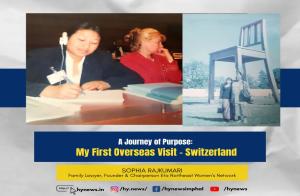
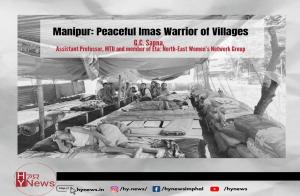

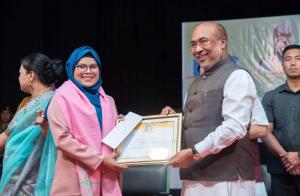
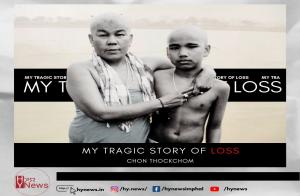
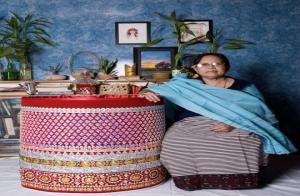

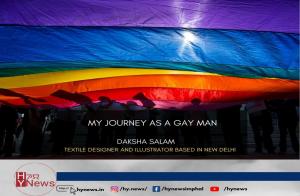
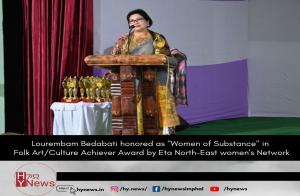
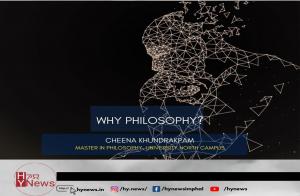
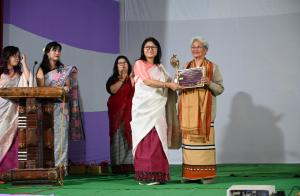
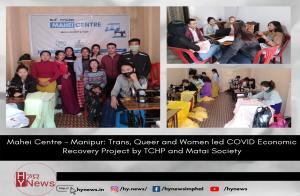
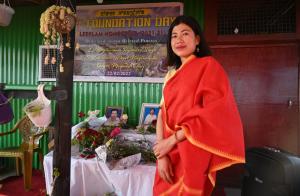


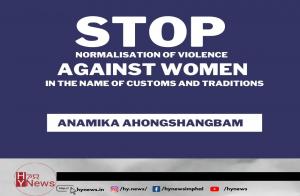






Leave Comments